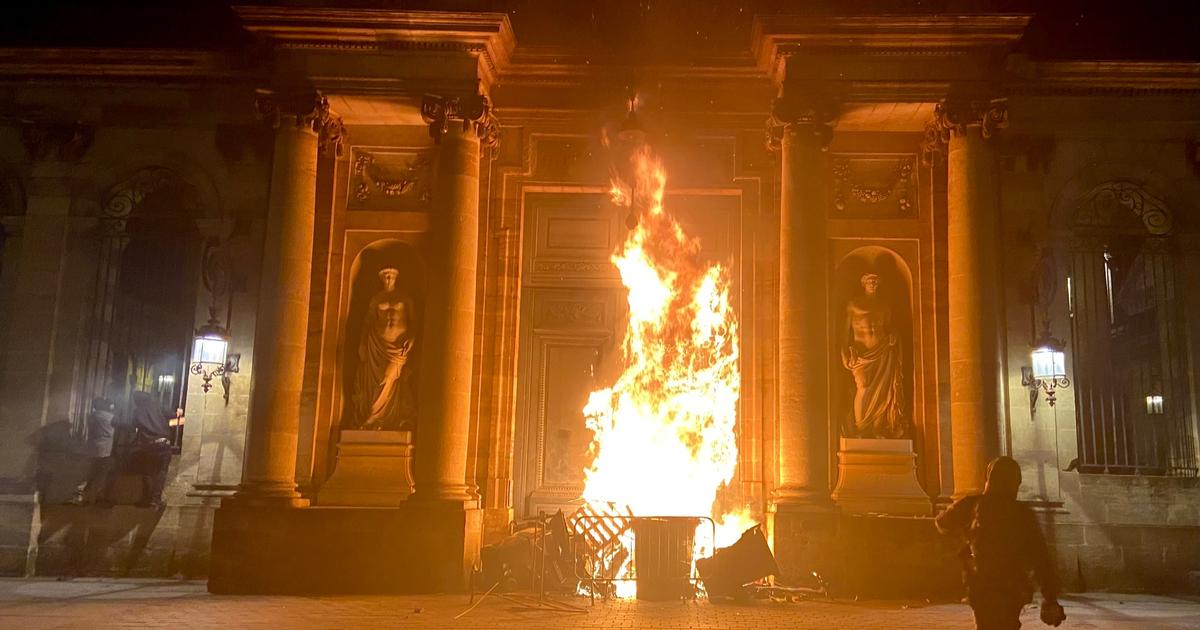The legislative journey of the pension reform in France is long, arduous and intense, but it has begun its final stretch.
President Emmanuel Macron's star proposal, which seeks to delay the retirement age from 62 to 64 by 2030 and accelerate the requirement to contribute for 43 years to collect a full pension, faces a decisive week in Parliament.
A group of deputies and senators must agree on a final version of the text on Wednesday, which, if approved, will be adopted or rejected on Thursday.
Nothing is closed and the Executive, which lacks an absolute majority in the National Assembly, seeks to ensure the last support.
Every vote counts.
The rejection not only comes from the chamber, but from the street, where new protests have been called.
Macron's plan has already sparked massive strikes and demonstrations across the country, including a high-impact garbage collection strike in Paris.
Two out of three French people, according to polls, oppose the reform, although the majority believe that the president will not back down.
"We will not give up our pension reform," insisted the government spokesman, Olivier Véran, on Monday on the LCI chain.
The Senate, the upper house controlled by the right-wing opposition, already took a first step on Saturday at midnight by approving the unpopular bill.
But in the National Assembly, the lower house, it will not be so simple.
The next session on Thursday threatens to be high-voltage and will probably determine the future of Macron's second and last five-year presidential term, re-elected in April.
There is still a stage to go.
In order for the Assembly to be able to pronounce itself, it is necessary for the so-called mixed joint commission, made up of seven senators and seven deputies, to agree on a final version of the text.
The meeting takes place this Wednesday and "it is very likely" that it will result in an agreement, given its composition, with only four opponents of the reform, says Maxime Tourbe, a specialist in Constitutional Law at the University of Paris 8. Otherwise , the deadline to adopt the law expires at the end of March.
More than 7,000 tons of rubbish accumulate today on the sidewalks of the capital, and although the strike only affects half of its twenty districts, it has become a real problem in the affected areas, manifested, for example, in the proliferation of rats. TERESA SUAREZ (EFE)
People walking next to garbage bags that have not been collected, this Monday.
Paris cleaning services are on strike over the new pension law that seeks to delay retirement until age 64.Lewis JOLY (AP)
Boxes of fruit and vegetables in the middle of the street in Paris, this Monday. TERESA SUAREZ (EFE)
A pigeon perches on an overflowing garbage container, in Paris, this Monday. DPA via Europa Press
Parisians getting into a car with the street full of garbage bags, this Tuesday.
Thousands of tons of garbage accumulate in the streets of the French capital after a week-long strike by garbage collection services against the French government's pension reform.ZAKARIA ABDELKAFI (AFP)
The garbage containers overflow and accumulate in the streets of Paris due to the strike of the garbage services against the pension reform, on Sunday 12. TERESA SUAREZ (EFE)
People walk on the pavement of a street in Paris, since the accumulation of garbage does not allow walking on the sidewalks, this Monday.Lewis JOLY (AP)
The view of a street in Paris full of garbage, this Monday. BENOIT TESSIER (REUTERS)
A man walks past a mountain of rubbish in Paris on Monday.Lewis JOLY (AP)
A man walks past a pile of rubbish in Paris on Tuesday.
The problem is not limited to garbage collection, but there are pickets blocking access to the three waste incinerators in the Paris metropolitan area. Mohammed Badra (EFE)
Thursday is shaping up to be a key day for the project.
The Government trusts that the Senate will once again give the go-ahead to the reform, this time final.
But in the Assembly, he will have to choose between two equally risky options: proceed to a vote or resort to the controversial article 49.3 of the Constitution, which allows parliamentary debates to end and adopt the law by decree.
In that case, the only way to stop the reform would be through a vote of no confidence against the government of the Prime Minister, Élisabeth Borne.
None of those that have been presented so far have prospered and Macron warned in September that he would dissolve the Assembly and call early legislative elections if such an initiative was successful.
The Executive will activate the first option, that of voting, if it considers that it can obtain a majority of support;
that is to say, 289. But, for the moment, he does not have them insured and he still has two days left to court those that are missing, even in the presidential camp itself.
Although they form the largest bloc of deputies (250), the macronistas have lacked a majority in the Assembly since the legislative elections last June.
The Executive depends on the right of Los Republicanos (61 deputies) to approve the project.
But the party, divided, keeps the suspense.
At the moment, 36 or 37 deputies will vote in favour.
But more is needed.
The Government has reiterated in recent days that it wants to avoid the second option, that of article 49.3.
In a meeting on Monday, Macron – who is usually silent on the reform – made one last appeal to the “responsibility of the oppositions”, according to several participants quoted by Agence France Presse.
"Sign of weakness"
If the Government activates 49.3, it runs the risk that the reform will be seen as an imposed law, both against the will of the population and its representatives.
"Adopting a text without a vote would be a sign of weakness for the government," analyzes Tourbe, from Paris 8. "It is a perfectly constitutional and legitimate tool, but it is seen as an instrument of force and an authoritarian act on the part of the government," Explain.
Laurent Berger, leader of the CFDT union, the first in the country, warned in
Le Journal du Dimanche
that applying 49.3 would be a "dangerous message for democracy."
The unions intensified their rejection last week with extendable strikes in sectors such as transport and energy.
In Paris, the garbage collection service has been unemployed for more than eight days and, according to the mayor's office, there are already more than 5,400 tons of waste accumulated in the streets.
The pulse continues this Wednesday, with the eighth day of protests, and the union leaders have already announced another in front of the Assembly on Thursday.
Follow all the international information on
and
, or in
our weekly newsletter
.
Subscribe to continue reading
Read without limits
Keep reading
I'm already a subscriber















